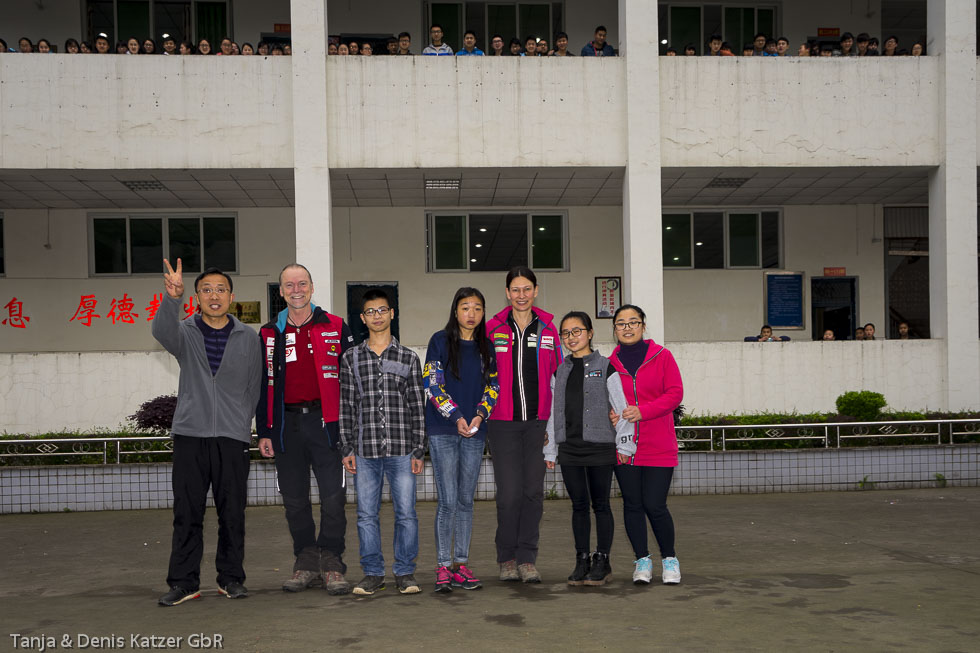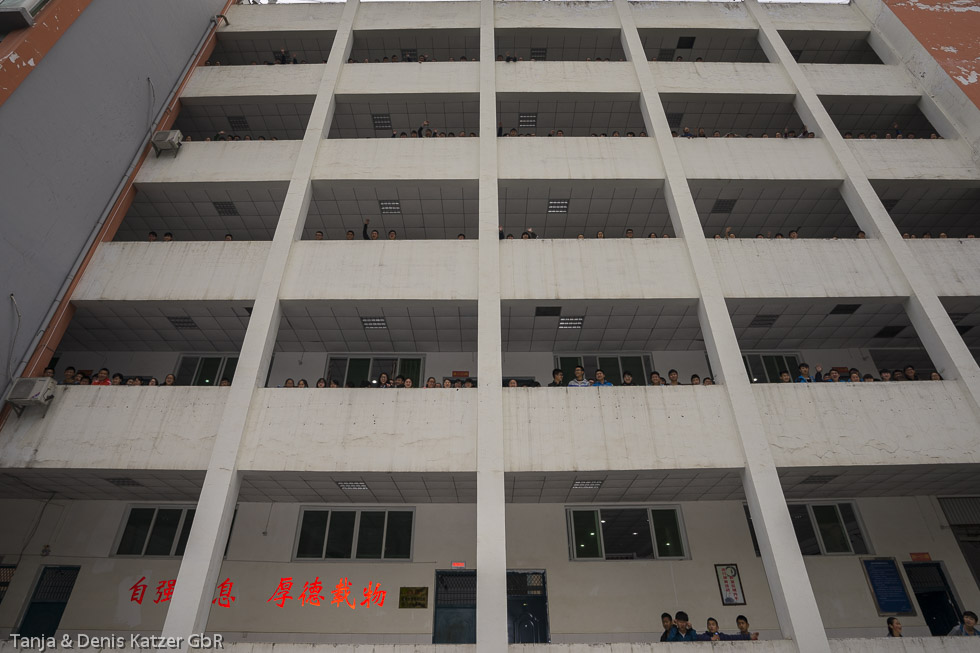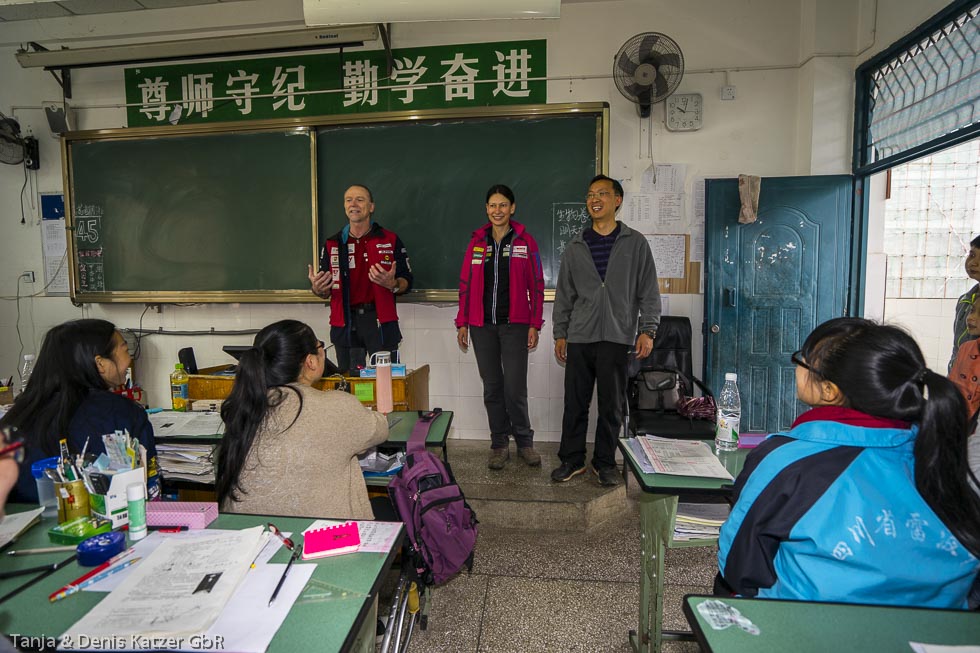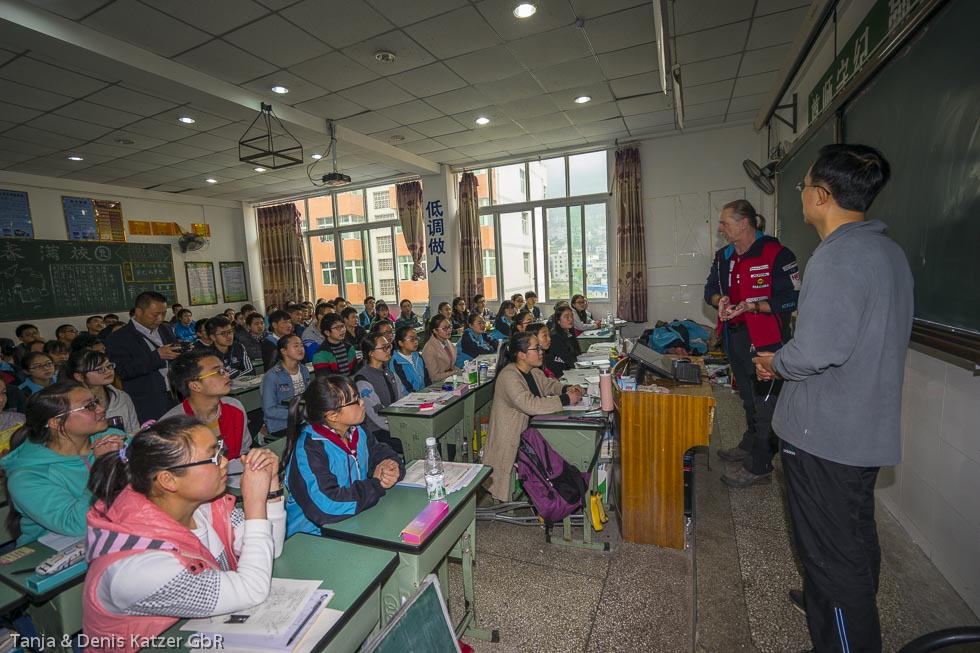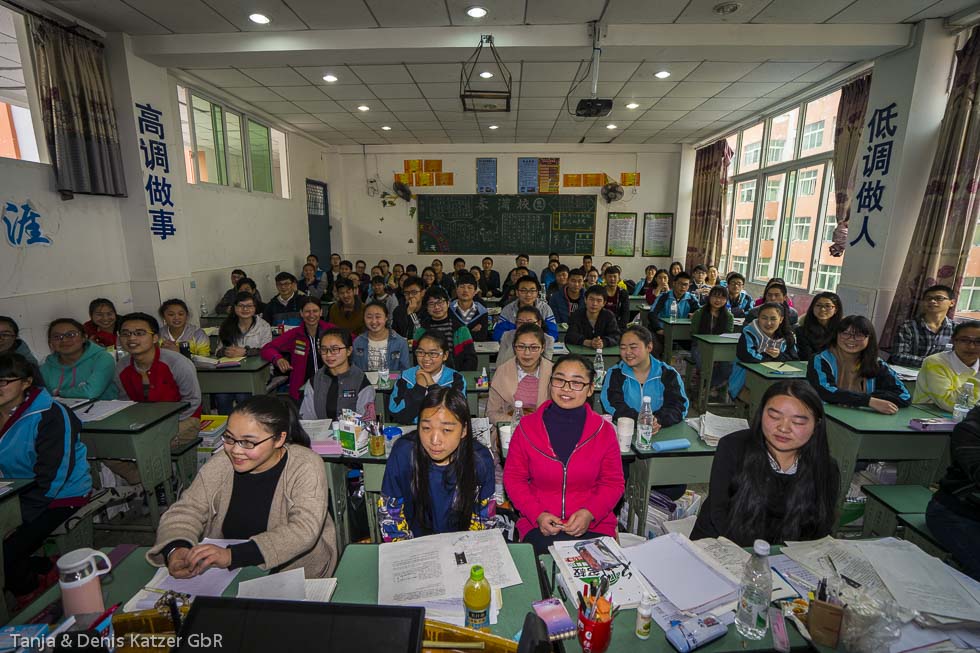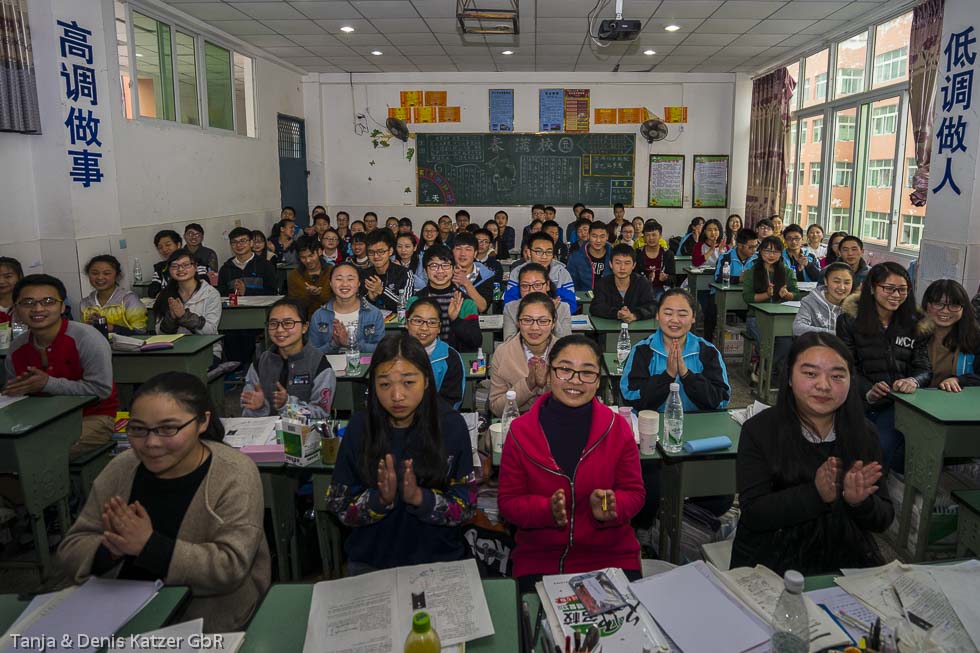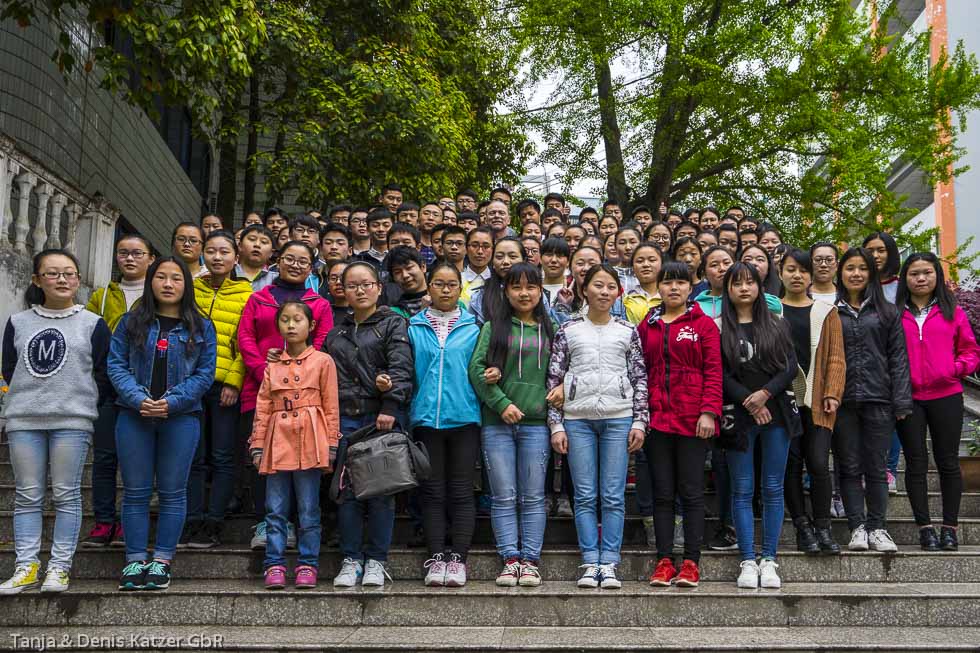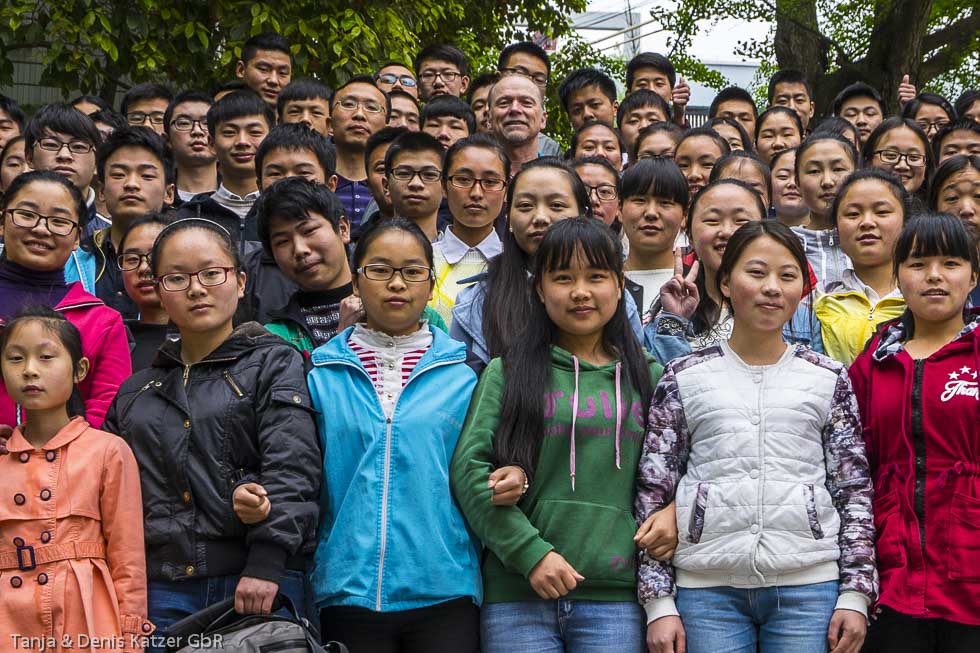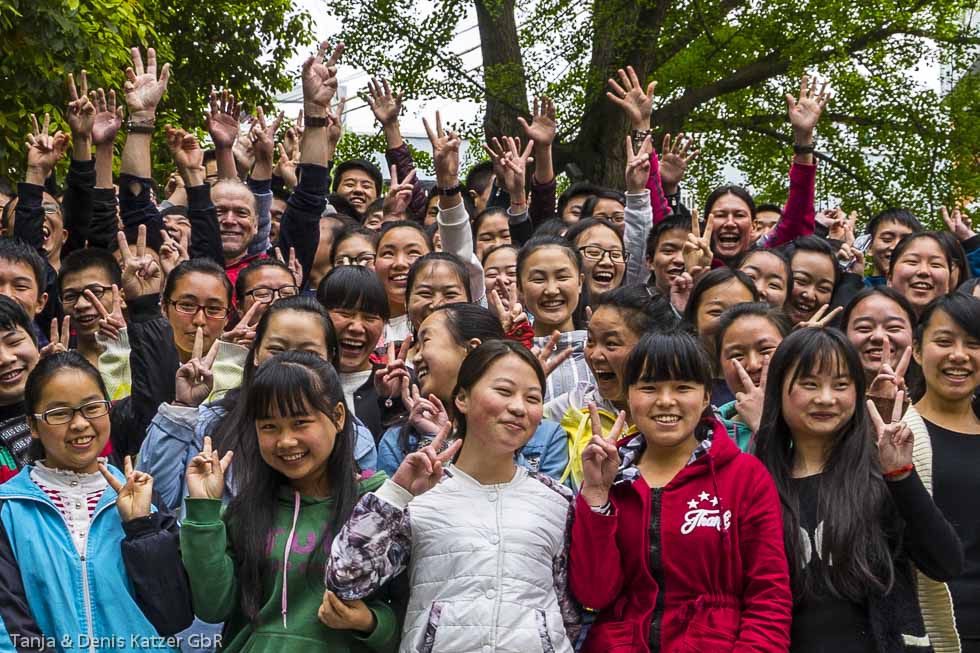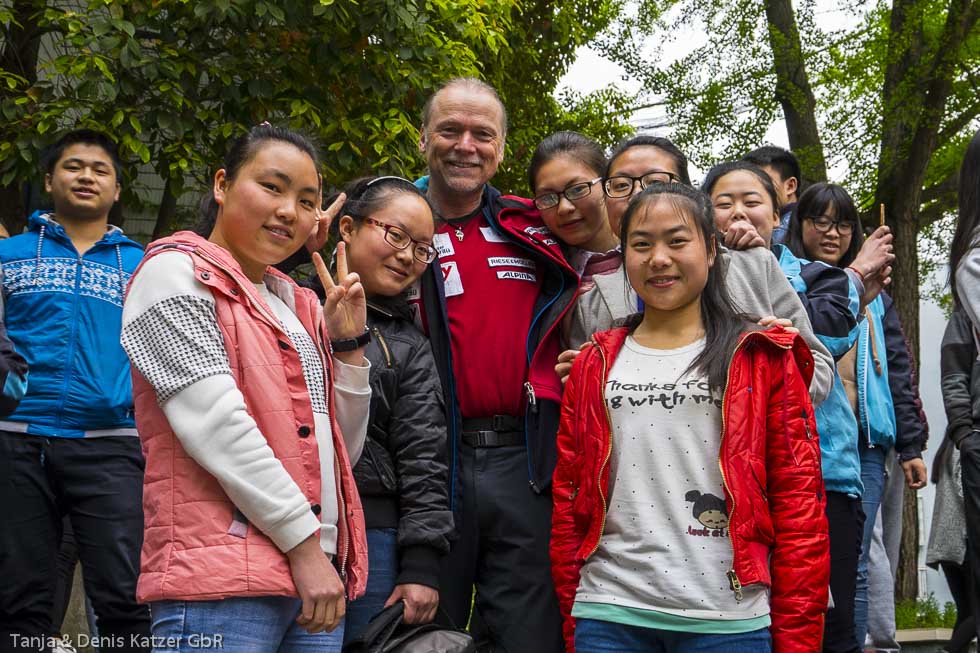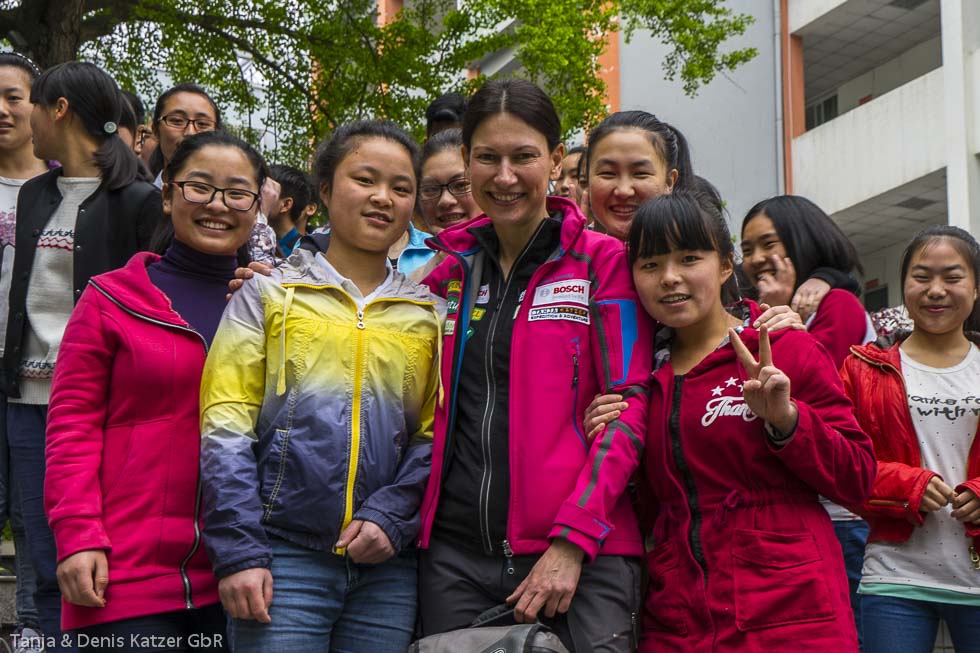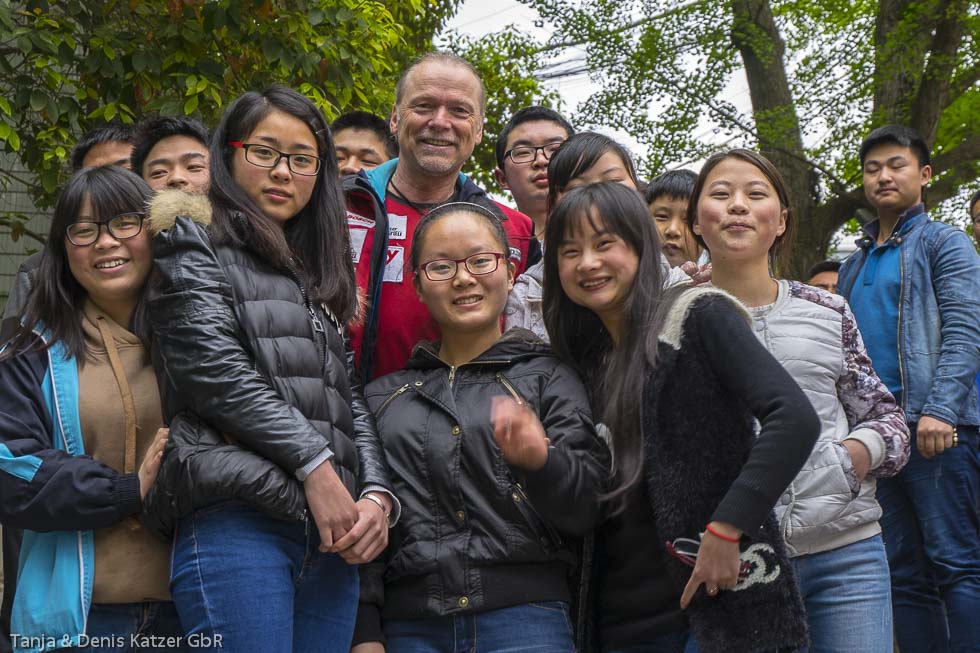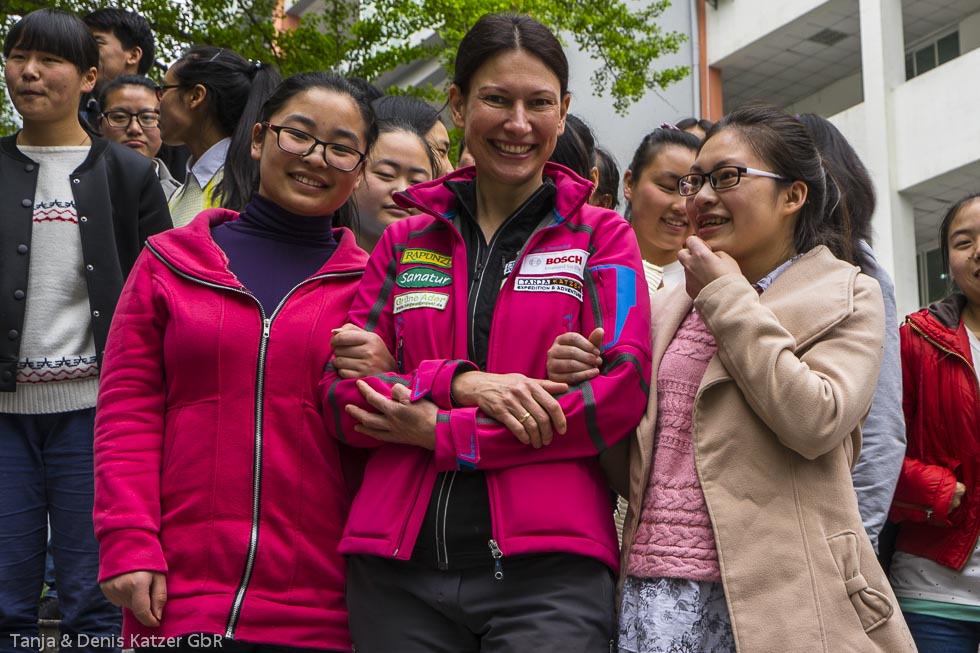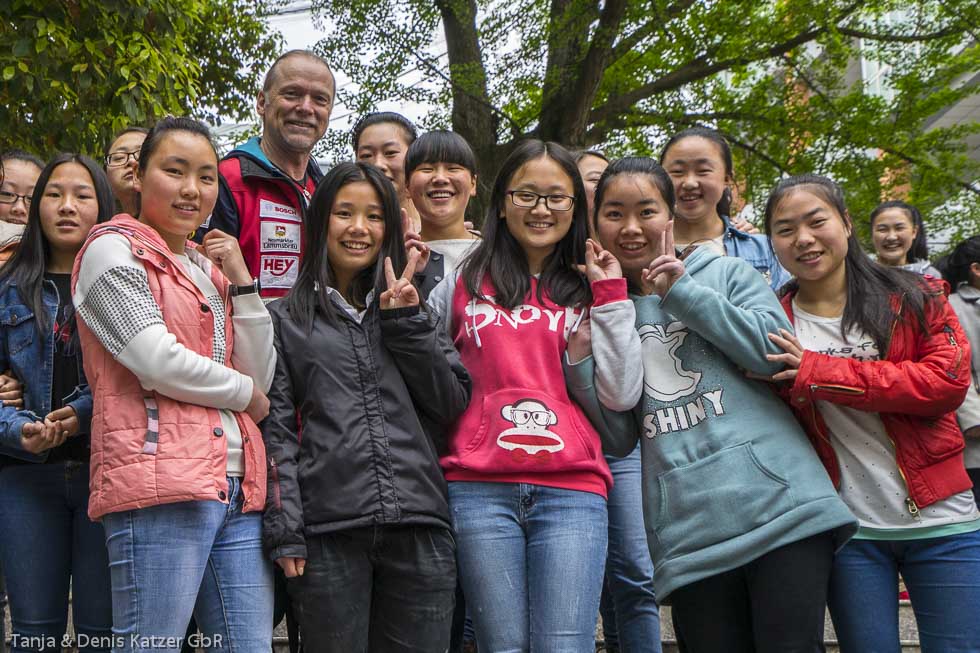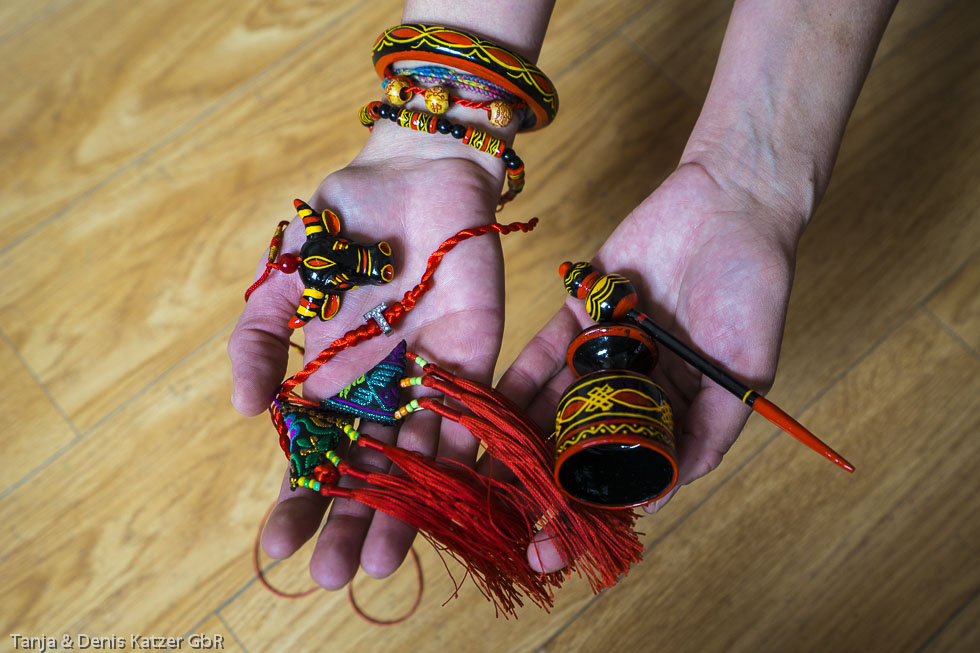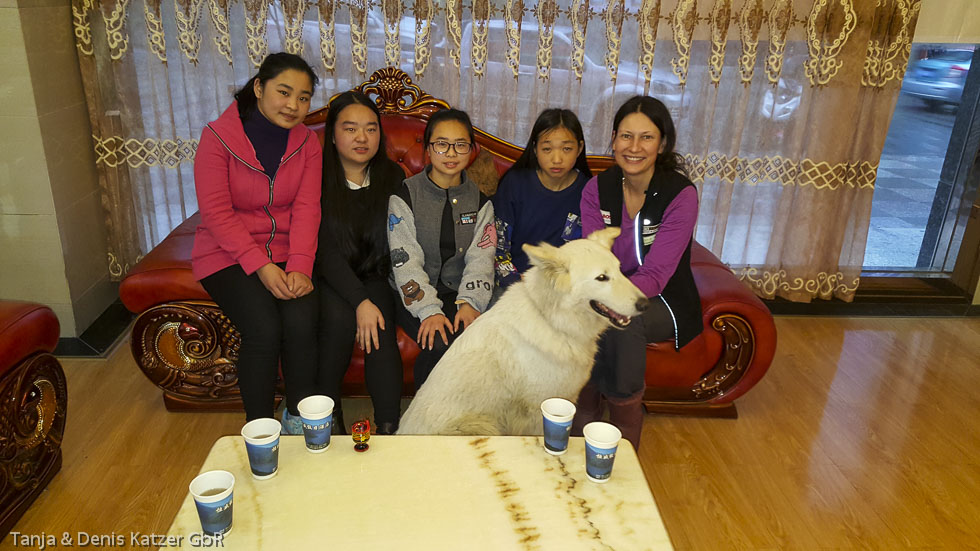
A guest at Leibo University
N 28°16'13.3'' E 103°34'34.9
Date:
21.04.2016 until 24.04.2016
Day: 298 – 301
Country:
China
Province:
Sichuan
Location:
Leibo
Latitude N:
28°16’13.3”
Longitude E:
103°34’34.9”
Total kilometers:
16,524 km
Total altitude meters:
30.814 m
Sunrise:
06:12 a.m. – 06:11 a.m.
Sunset:
7:51 pm – 7:53 pm
Temperature day max:
22°C
Temperature day min:
17°C
(Photos of the diary entry can be found at the end of the text).
We have been waiting eleven days for our spare parts from Germany. According to the tracking number, the shipment has been in Shanghai for six days and should have been here a long time ago. The delay is due to the Chinese domestic courier service, which does not deliver to the mountain town of Leibo. The parcel has been stuck in the provincial capital of Xichang for days. The hotel manager has used her contacts, which is why the important spare parts are now being transported to us on a private truck over the mountains. However, a landslide has blocked the road. “It will be there tomorrow evening,” the English teacher Richard translates for us and asks if we can do him the favor of visiting his school tomorrow. In the evening, I immerse myself in the route ahead of us. Due to the unplanned forced stopover, there is now very little time to make the 500-kilometer arc westwards. There we actually wanted to visit the 3,000-year-old cultural and historical city of Dali. “If we actually get the parts tomorrow, I can fit the brake calliper and fill it with new brake fluid without any problems, we’ll be ready to go again. But I don’t think we’ll make it,” I think. “And what would be the alternative?” Tanja wants to know. “We would have to drive directly south from the city of Xichang. That would save us 500 km and give us more time.” “Hm, of course I’d like to visit Dali, but we’ve already seen lots of great places in China. Apart from that, there’s no point in traveling under stress. We have enough of that in Germany.” In keeping with the motto “less is more”, we decide that evening to take the shorter, almost 1,000 km route to Vietnam.
In the morning, Richard picks us up in the hotel lobby with three of his model students. “We are all extremely pleased that you are taking the time to visit my students and speak to them,” says Richard on the way to school. “We’re very happy to do that Richard. How many students do you actually teach?” “I have two main classes with 70 English students each. However, there is only one class here today. There was already a discussion about which of my two classes would be allowed to receive you, but the timing of your visit was the deciding factor. When your spare parts delivery arrives, you will surely be leaving soon?” “Yes, we have to. It’s still a long way to the Vietnamese border and we’ve been here much longer than planned,” I reply and ask him if the students really have to attend as many lessons as we’ve been told in the past. “Classes start at 7:20 a.m. and go until 9:30 p.m.” “Until 9:30 pm? That’s an eternity.” “They’re busy days, but I like being a teacher.” “And do you have weekends off?” “No, no. Saturday is a full teaching day. Only Sunday goes until noon. The afternoon is free for everyone.” “Unbelievable. It almost sounds a bit inhuman.” “That’s how it is in China, but today is a very special day because you’re here. Since I told my students about your visit yesterday, they’ve been really excited. I am sure that no one will be absent today. You are the first foreigners to visit our school. This is a fantastic opportunity for my students to try out the English they have learned,” the dedicated teacher chats.
We are greeted politely at the gate. As soon as we enter the schoolyard, numerous students sprint onto the balconies of a five-storey building and cheer us on. On the other side of the courtyard, where there are no balconies, countless curious faces appear. The cheers and shouts make us believe that all 3,000 students from the school are present. “It’s almost like we’re pop stars,” I say to Tanja with a grin. Before we go into the building, we take a few photos with Richard and his best students. Another teacher rushes around us with his camera, taking pictures of the guests from every angle. Followed by a few teachers and a large crowd of students, we make our way into the main building. “Here you go,” Richard waves us into the classroom with a sweeping motion. As soon as we step through the doorway, we are met with a roar of applause. “Welcome! Welcome! Welcome!”, the 70 students in the classroom shout joyfully, almost bringing tears to our eyes with emotion. The English teacher raises his hands in reassurance. Silence falls immediately. Richard explains where we come from and that we have cycled from Europe to China. Another round of applause immediately breaks out in the small, overcrowded classroom. “Tanja and Denis will tell you everything else in person,” he says, whereupon the 140 hands clap together again. Then we introduce ourselves personally. The 17 to 18-year-old girls and boys listen attentively to our words. We talk about our lives, about our 25-year journey so far, the countless experiences, about hospitality, different customs, rites and traditions. We talk about the different religions, about acceptance, tolerance and understanding for one another. We tell the 140 eyes staring at us that we are all one on this planet. That there is no difference between a Chinese and a German. “We are all citizens of the earth, have two arms, two legs, one head. The color of our skin and the shape of our face is completely irrelevant. The point is that we are all human beings living on a beautiful blue planet that we must protect for future generations. Wars must be a thing of the past. We left the Stone Age behind us a long time ago and no longer need to beat each other over the head with clubs to enrich or oppress each other,” I say, to which another storm of applause breaks out. “I was once in an elite unit myself and even then I realized I was a pacifist. The path of the peaceful warrior is a path full of life, brings satisfaction, happiness and joyful prospects for the future.” Although time is pressing, we are still talking about food, its poisoning by pesticides and chemical fertilizers. We talk about the fact that you are what you eat. “Take care of your beautiful China. Progress is not everything. If there are no more green trees and bushes in the future, if there are no more clouds to be seen because of all the smog and you all have to walk around with breathing masks, if no more bees fly from flower to flower to pollinate them because there are no more flowers, if every little stream and big river like the Jiangtsekiang is polluted, there will be no tomorrow for China either,” I say, knowing that I’m going out on a limb with this topic. “You’re right,” says a student. I come from a village on Mahu Lake. Twenty years ago, it was a beautiful clear lake. Today it’s poisoned and we can only fish contaminated fish from it.”
At the end of our one-hour lecture, Richard invites his students to ask us questions. It takes a long time for the shy young people to raise their hands. “And you were really a soldier in an elite unit?” asks one of the students. “Yes.” “Cool,” he replies, which makes me wonder if he has understood what this short lecture was all about. “Will we humans ever learn to live together in peace?” I ask myself. “What you’re doing is wonderful. I’d like to give you a present,” says another student, slowly coming forward and handing me a key ring with a snap hook. “I want to give them this as a souvenir of us,” he says, his whole body trembling with excitement. “But there’s still a key on it,” I reply and hand him back his apartment key. “Xie xie,” he thanks me. “Xie xie,” I thank him too. “I want to be an adventurer too,” says a girl. “Then believe in it. Everything we imagine and pursue with determination can be turned into reality,” Tanja replies with a friendly smile.
The hour has flown by. “Can we have another photo with them?” some pupils ask. “Gladly”, we reply and suggest the school playground. The class leaves their room amid excited conversations and confusion. Outside in the courtyard, we are photographed in every conceivable position. We smile friendly into the camera of the school photographer, who is mainly the geography teacher at the school. Many people then pull out their smartphone to take their own photo. We are showered with compliments and if Richard didn’t put a stop to it, the photo session would go on forever. As we say goodbye to the school, its pupils shout congratulations of all kinds from the balconies and windows. We wave back and leave the school with Richard.
As soon as we get back to our accommodation, we receive our package with the new brake caliper and brake pads. I immediately pick up my bike from the lobby, roll it into the elevator and take it to the fifth floor. Although I have learned how to refill brakes in various workshops at Riese und Müller, I have great respect for this repair. I read the instructions that Magura sent along. Then I watch a video on the Internet that describes exactly how to refill the brakes with brake fluid and lo and behold, it’s easier than I thought. An hour later, my front brake is working perfectly. To make sure that no brake fluid is leaking anywhere, I take my super bike for a few laps through the streets of Leibo. “And?” asks Tanja. “Everything is perfect. Our journey can continue,’ I reply with a grin.
In the evening, Gina, Kate, Lucy and Meli from the school class come to visit us to give us a present. So we receive little lucky charms from the local Yi people…
If you would like to find out more about our adventures, you can find our books under this link.
The live coverage is supported by the companies Gesat GmbH: www.gesat.com and roda computer GmbH http://roda-computer.com/ The satellite telephone Explorer 300 from Gesat and the rugged notebook Pegasus RP9 from Roda are the pillars of the transmission.
